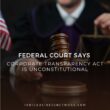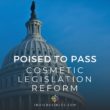On October 15, 2009, the FDA and the FTC sent a joint warning letter to Weil Lifestyle, LLC (owned by Dr. Andew Weil, a physician (not sure if he's licensed at this time in any state) and health/wellness advisor), about a product marketed at his website called Immune Support Formula. The next day, the Today Show and other media outlets ran stories on the warning letter.
Dr. Weil then supplemented his website with his position.
The product, alleges FDA/FTC in its letter, purports to claim to affect the body's ability to fight H1N1. The letter advises that, since the product has not been approved, cleared or otherwise authorized for use in the diagnosis, mitigation, prevention, treatment, or cure of the H1N1 Flu Virus, Dr. Weil must “immediately cease marketing unapproved, uncleared, or unauthorized products for the diagnosis, mitigation, prevention, treatment, or cure of the H1N1 Flu Virus.”
You can read the entire letter here.
The Immune Support Formula is still for sale at the site as of the time I am writing this at this link. The link to purchase the product goes to Amazon.com.
PLEASE note that I am not sure whether the warning letter refers to another product called Immune Support Formula. The one cited above is a “condition specific supplement” at Dr. Weil's cite. Note that vitamins and nutritional supplements are not regulated as “drugs” by the FDA so it's possible that the original warning was for another product that has been removed. Or it could have been for the supplement product still mentioned at the site. I'm assuming the latter, but could be incorrect.
Why This Is Important
I have no first-hand details about this situation and I am not sure of the details, but the message is absolutely clear, confirming what the law has been for decades: marketing products that make drug claims, without the federal government's pre-market approval, are illegal, and marketing them can subject you to significant civil penalties — not to mention a whole lot of bad PR.
This incident underscores that we must all be careful of the claims we make on our products. If a cosmetic claims to treat any condition or affect the structure or function of the human body, it is classified as a drug by the federal government. Any such claims that have not been pre-approved by the FDA are illegal and should not be sold.
This is not new. It has been the state of the law for man years. However, with the advent of the Internet and so many people starting small businesses, the federal government seems to be stepping up its regulatory oversight. It is far easier for them to do so today because of the transparency of the Internet. A simple Google search will turn up any number of cosmetics that make drug-like claims.
Whether you market your products here, at your own branded, website, on etsy or on Twitter, the claims you make will follow you and are easily tracked by the FDA, FTC, state regulatory agencies, consumer groups and customers.
What To Do?
Check the FDA's website to make sure you know what is and is not permitted in terms of marketing your products.
A good place to start is with, “Is It a Cosmetic, a Drug, or Both? (Or Is It Soap?)” It contains useful direction, in layman's terms, and will serve to at least let you know whether any of your marketing claims present issues that require follow-up or clarification.
If you find that any claims cross the line or approach it, sit down and make the appropriate changes.
The Soap and Cosmetics Labeling Book by Marie Gale is also an excellent resource.
I have spoken with several companies in the last few months who are in fact selling products that are regulated as drugs. One, a vaginal yeast product that comes with an insertion applicator, gave me particular concern (and I expressed this concern to the maker of the product). But a product does not need to be internal in order to be classified as a drug.
Claims for things such as healing eczema, dandruff and more are also concerns, and there are others. Please educate yourself so you don't run into any problems. If a product claim is questionable in your mind, at a minimum it is advisable to stop making it until you clear with your own attorney (or use Marie's book and the FDA's website, if you cannot afford an attorney) that the language does not cross the line.
Additional Useful Links
FTC Regulation under Fair Labeling & Packaging Act
FDA Regulations under Food, Drug & Cosmetic Act
I know that many small business owners are not used to reading these types of laws, but that is no explanation for not adhering to them. Again, Marie Gale's book does a good job of supplementing them so use that book in conjunction with reading up on the law yourself.
I have scheduled an IBN member conference call to review applicable laws on November 5 at noon New York Time.



